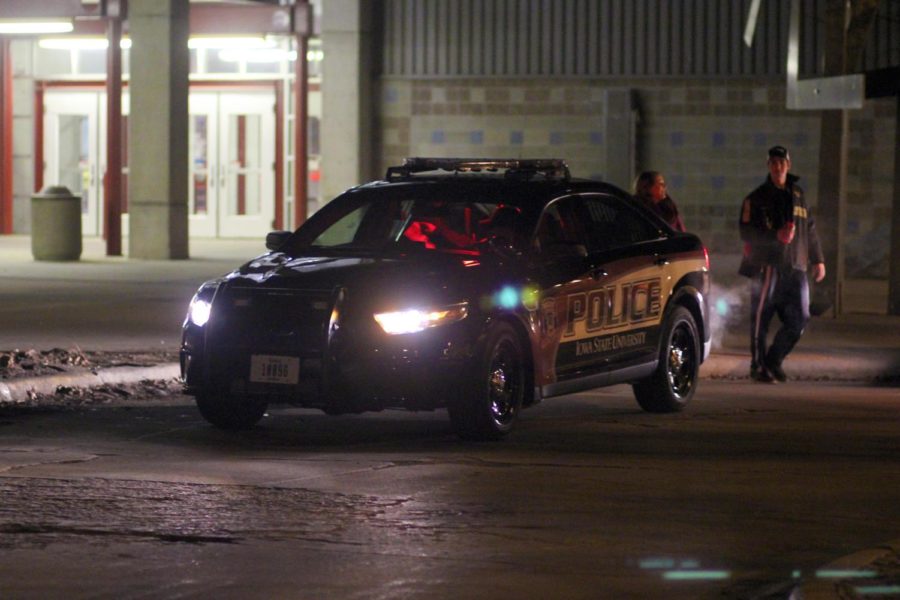ISU Police prepares the public for the worst
ISU Police is its own police department, working alongside Ames Police to maintain a safe community.
The Iowa State University Police Department offers a variety of types of training and courses to educate members of the public on how to respond to evermore prevalent incidents of violence.
“We always tell students that you need to think about your personal safety, right? We do a lot here, but it’s a two-way street–it’s a partnership,” said Micheal Newton, chief of police for Iowa State University Police Department. “You have the police, our public safety personnel, doing pieces, but you also are a key ingredient in safety and security.”
According to Newton, students and members of the general public should stick to the age-old slogan of “see something, say something.” Reporting suspicious behavior could allow police to intervene and prevent incidents before they happen. Citizens taking an active role in their public safety can help police to do their job effectively and efficiently.
Iowa State University Police offers extensive outreach programs to help citizens take up such a role in their safety. Iowa State Police programs range from self-defense classes to a course on recognizing and reporting disruptive behavior. People can request classes by reaching out to Iowa State University Police outreach at [email protected].
Iowa State University Police does not typically train individuals in their desired course, rather having interested personnel group-ups. There are no scheduled public events. Rather interested parties can request training and then be grouped up with other parties interested in similar pieces of training.
“We a lot of times like to ask people to find a group so that we have more than one or two people in the training,” Newton said. “But sometimes we offer the training, and other groups will allow other people to come in, so we do that sometimes with self-defense.”
The most popular training requested is self-defense training. Some other common pieces of training offered by the police department are Violent Intrusion Response Training (VIRT) and Recognizing and Reporting Disruptive Behavior (RRDB).
According to Newton, many people like to take the Violent Intrusion Response Training first and then circle back to Recognizing and Reporting Disruptive Behavior. Newton said while both these types of training are significant, it would make more sense to learn the behaviors that may lead up to a violent outbreak then learn the optimal responses to such an incident.
“I always tell people that our RRDB training is really good to take and then the violent incident response because we want to try and prevent many of the things from happening,” Newton said. “People really focus on getting the immediate training, the violent incident response training, but what if we were to prevent that? What if we were to recognize the behaviors and call law enforcement, call mental health professionals, whatever it might be, before these incidents?”
In the name of preventing violent incidents, the outreach team runs any of its various types of training a couple of times a week. According to Newton the outreach team is occasionally booked a ways out, the outreach team remains flexible, squeezing groups in where they can.
According to Newton, the Recognizing and Reporting Disruptive Behavior training is the best place to start when looking to better understand and prevent acts of violence.
“RRDB really deals with looking at creating awareness, as well as mitigating those potential acts of violence, those things that you’re that you’re looking for,” Newton said. “Whereas when you get to VIRT, you’re really looking at okay, the violence is happening now, how do I respond?”
Iowa State University Police’s Violent Intrusion Response Training follows the avoid, deny, defend philosophy of protecting against violent incidents. This means participants in the program are trained first off to avoid contact with a shooter or attacker. If contact is unavoidable, people should look to denying access to a shooter. This can mean locking or barricading a door as well as again looking for a chance to escape. Finally, Violent Intrusion Response Training trains people to defend themselves if worse comes to worst.
“We teach those avoid, deny, defend strategies, and they’ll do some practical pieces in there talking through what this would look like,” Newton said. “So when we’re in an emergency situation, if we’re sitting in a classroom and something happens, trying to get you to think through ‘how would I respond, what would I do?’”
According to Newton, Iowa State University Police works hard to prepare its police force to respond to such situations, making sure training is above the state standards.
“This last year, we did a series of three different training sessions that all of our staff had to go through. One month we did a basic training just going back over the principles of how we respond to these emergent events, or the active killer events,” Newton said. “The second training we did more of the hands-on skills, and then the third session we did was full scale. We had bad guys, we had good people, we had a lot of our students and some of our staff members on campus helped with that.”
Iowa State University Police’s outreach programs exist to make the police force more accessible and responsive to the needs of students at Iowa State. According to Newton, the police department has multiple programs to encourage students and members of the public to get involved with the safety of the community, including hearing from a student advisory board throughout the school year.
Your donation will support the student journalists of the Iowa State Daily. Your contribution will allow us to purchase equipment, send our student journalists to conferences and off-set their cost of living so they can continue to do best-in-the-nation work at the Iowa State Daily.
















